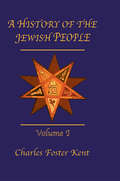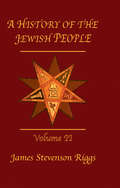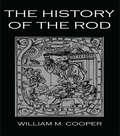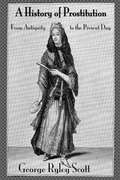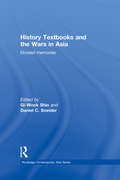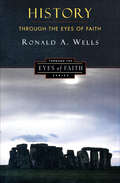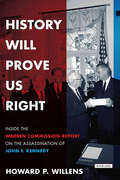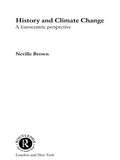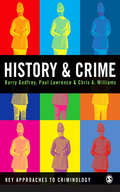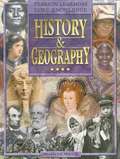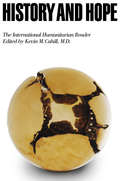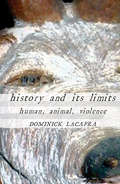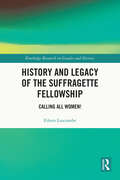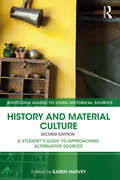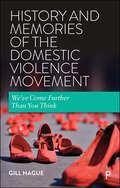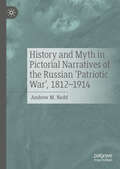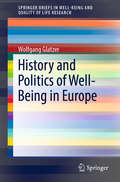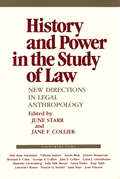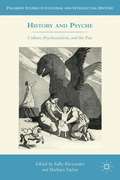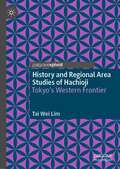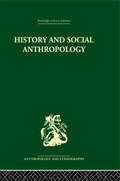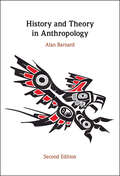- Table View
- List View
History Of The Jewish People Vol 1: During The Babylonian, Persian, And Greek Periods
by KentFirst published in 2007. Routledge is an imprint of Taylor & Francis, an informa company.
History Of The Jewish People Vol 2: During The Maccabean And Roman Periods (including New Testament Times)
by RiggsFirst published in 2007. Routledge is an imprint of Taylor & Francis, an informa company.
History Of The Rod: A History Of The Rod In All Countries From The Earliest Period To The Present Time
by CooperFirst published in 2005. Routledge is an imprint of Taylor & Francis, an informa company.
History Prostitution: From Antiquity to the Present Day
by ScottFirst published in 2006. Routledge is an imprint of Taylor & Francis, an informa company.
History Solved Paper I Competitive Exam
by Indic TrustThis is a compilation of questions answer of Civil Service Examination History Solved Paper I.
History Textbooks and the Wars in Asia: Divided Memories (Routledge Contemporary Asia Series)
by Gi-Wook Shin Daniel C. SneiderOver the past fifteen years Northeast Asia has witnessed growing intraregional exchanges and interactions, especially in the realms of culture and economy. Still, the region cannot escape from the burden of history. This book examines the formation of historical memory in four Northeast Asian societies (China, Japan, South Korea, and Taiwan) and the United States focusing on the period from the beginning of the Sino-Japanese war in 1931 until the formal conclusion of the Pacific War with the San Francisco Peace Treaty of 1951. The contributors analyse the recent efforts of Korean, Japanese, and Chinese scholars to write a ‘common history’ of Northeast Asia and question the underlying motivations for their efforts and subsequent achievements. In doing so, they contend that the greatest obstacle to reconciliation in Northeast Asia lies in the existence of divided, and often conflicting, historical memories. The book argues that a more fruitful approach lies in understanding how historical memory has evolved in each country and been incorporated into respective master narratives. Through uncovering the existence of different master narratives, it is hoped, citizens will develop a more self-critical, self-reflective approach to their own history and that such an introspective effort has the potential to lay the foundation for greater self- and mutual understanding and eventual historical reconciliation in the region. This book will be essential reading for students and scholars of Asian history, Asian education and international relations in East Asia.
History Through the Eyes of Faith: Christian College Coalition Series (Through the Eyes of Faith)
by Ronald A. WellsA Christian perspective on the major epochs, issues, and events in the history of Western Civilization.In this groundbreaking work, prominent historian Ronald A. Wells integrates Christian faith with a historical view of Western civilization. By clearly outlining the cultures of the ancient Greeks and Hebrews, the Middle Ages, the Renaissance, and the modern world, Wells illuminates our present situation and explores the major debates among historians today. The author invites the reader to apply the study of history to what “he or she already knows—that the kingdom of God and the kingdom of the world are not the same; while we dwell in both for a time, we know which one is coming, and which one we should seek first.”This comprehensive study, one of a series cosponsored by the Council for Christian Colleges & Universities, addresses questions faced by Christian students as they explore the history of Western civilization.
History Will Prove Us Right: Inside the Warren Commission Report on the Assassination of John F. Kennedy
by Howard P. WillensIn this &“illuminating&” insider account &“Willens covers all his bases [in] a chapter-by-chapter breakdown of the [Warren] commission report.&” (Publishers Weekly) Everything was over in seconds, but the events of November 22, 1963 have been debated for more than five decades. The presidential commission tasked with finding the truth about the Kennedy assassination, headed by then-Chief Justice Earl Warren, concluded that Oswald had acted alone. But the report did little to quell conspiracy theorists. Warren himself calmly dismissed the criticism, assuring his fellow commission members that &“history will prove that we are right.&” This eye-opening account by Howard P. Willens, one of the few living staff members of the Warren Commission, reveals that Warren's words were prescient. Drawn from Willens' own journals and extensive notes on the investigation, History Will Prove Us Right tells the complete story of every aspect of the investigation into one of the century's most controversial events from a uniquely first-person perspective. &“Fascinating . . . Many will still disagree with the Warren Commission&’s conclusion, but this book serves a valuable function by laying out how it did its work.&” —Booklist &“ A behind-the-scenes take on the investigation, its personalities and methodology. One by one [Willens] discards alternatives to the lone gunman theory.&” —The Guardian &“The commission got it right — Oswald was the sole assassin —and that conclusion holds up after 50 years of scrutiny.&” —The Washington Post &“Willens's account deserves close and careful scrutiny by anyone interested in the Kennedy assassination.&” —Library Journal &“A superbly written account by someone who knows precisely what needs to be said and how to say it.&” —Kirkus Reviews
History and Climate Change: A Eurocentric Perspective (Routledge Studies in Physical Geography and Environment)
by Neville BrownHistory and Climate Change is a balanced and comprehensive overview of the links between climate and man's advance from early to modern times. It draws upon demographic, economic, urban, religious and military perspectives. It is a synthesis of the many historical and scientific theories, which have arisen regarding man's progress through the ages.Central to the book is the question of whether climate variation is a fundamental trigger mechanism from which other historical sequences develop, or one amongst a number of other factors, decisive only when a regime/society is poised for change. Evidence for prolonged climate change is not that extensive. But it is clear that climatic variation has regularly played a part in historical development. Paricular attention is here paid to Europe since AD 211.Cold and warmth, wetness and aridity can create contrary reactions within societies, which can be interpreted in vary different ways by scholars from differenct disciplines. Does climate change exacerbate famine and epidemics? Did climate fluctuation play a part in pivotal historical events such as the mass exodus of Hsuing-nu from China, the pressure of the Huns on the Romans and the genesis of the Crusades? Did the bitter Finnish winter of 1939-40 ensure the ultimate defeat of Hitler? These episodes, and many others are discussed throughout the book in the authors distinctive style, with maps and photographs to illustrate the examples given.
History and Crime (Key Approaches to Criminology)
by Dr Barry S Godfrey Chris A Williams Dr Paul LawrenceThis lively and accessible text provides an introduction to the history of crime and crime control. It explains the historical background that is essential for an understanding of contemporary criminal justice, and examines the historical context for contemporary criminological debates. Topics covered include: Crime statistics Constructions of criminality Policing Prisons Surveillance Governance White-collar crime Immigration and crime For each topic, the book provides an overview of current research, comment on current arguments and links to wider debates. The Key Approaches to Criminology series celebrates the removal of traditional barriers between disciplines and, specifically, reflects criminology's interdisciplinary nature and focus. It brings together some of the leading scholars working at the intersections of criminology and related subjects. Each book in the series helps readers to make intellectual connections between criminology and other discourses, and to understand the importance of studying crime and criminal justice within the context of broader debates. The series is intended to have appeal across the entire range of undergraduate and postgraduate studies and beyond, comprising books which offer introductions to the fields as well as advancing ideas and knowledge in their subject areas.
History and Geography (Grade #5)
by E. D. Hirsch Jr.History and geography textbook for 5th graders.
History and Hope: The International Humanitarian Reader (International Humanitarian Affairs)
by Kevin M. CahillHistory and Hope: The International Humanitarian Reader provides a better understanding—both within and outside academia—of the multifaceted demands posed by humanitarian assistance programs. The Reader is a compilation of the most important chapters in the twelve-volume International Humanitarian Affairs book series published by Fordham University Press. Each selected chapter has been edited and updated.In addition, the series editor, Kevin M. Cahill, M.D., has written, among other chapters, an introductory essay explaining the academic evolution of the discipline of humanitarian assistance. It focuses on the “Fordham Experience”: its Institute of International Humanitarian Affairs (IIHA) has developed practical programs for training fieldworkers, especially those dealing with complex emergencies following conflicts and man-made ornatural disasters.
History and Its Limits: Human, Animal, Violence
by Dominick LacapraDominick LaCapra's History and Its Limits articulates the relations among intellectual history, cultural history, and critical theory, examining the recent rise of "Practice Theory" and probing the limitations of prevalent forms of humanism. LaCapra focuses on the problem of understanding extreme cases, specifically events and experiences involving violence and victimization. He asks how historians treat and are simultaneously implicated in the traumatic processes they attempt to represent. In addressing these questions, he also investigates violence's impact on various types of writing and establishes a distinctive role for critical theory in the face of an insufficiently discriminating aesthetic of the sublime (often unreflectively amalgamated with the uncanny). In History and Its Limits, LaCapra inquires into the related phenomenon of a turn to the "postsecular," even the messianic or the miraculous, in recent theoretical discussions of extreme events by such prominent figures as Giorgio Agamben, Eric L. Santner, and Slavoj Zizek. In a related vein, he discusses Martin Heidegger's evocative, if not enchanting, understanding of "The Origin of the Work of Art." LaCapra subjects to critical scrutiny the sometimes internally divided way in which violence has been valorized in sacrificial, regenerative, or redemptive terms by a series of important modern intellectuals on both the far right and the far left, including Georges Sorel, the early Walter Benjamin, Georges Bataille, Frantz Fanon, and Ernst Jünger. Violence and victimization are prominent in the relation between the human and the animal. LaCapra questions prevalent anthropocentrism (evident even in theorists of the "posthuman") and the long-standing quest for a decisive criterion separating or dividing the human from the animal. LaCapra regards this attempt to fix the difference as misguided and potentially dangerous because it renders insufficiently problematic the manner in which humans treat other animals and interact with the environment. In raising the issue of desirable transformations in modernity, History and Its Limits examines the legitimacy of normative limits necessary for life in common and explores the disconcerting role of transgressive initiatives beyond limits (including limits blocking the recognition that humans are themselves animals).
History and Legacy of the Suffragette Fellowship: Calling all Women! (Routledge Research in Gender and History)
by Eileen LuscombeHistory and Legacy of the Suffragette Fellowship provides a biographical account of the scope and depth of the memory work of the now-forgotten commemorative group the Suffragette Fellowship, active from the 1920s to the 1970s. The Suffragette Fellowship comprised members from the militant suffrage groups known as the Women’s Social and Political Union, the Women’s Freedom League, and the Actress Franchise League. This research provides a comprehensive analysis of the Fellowship’s attempts to form and sustain a collective Suffragette identity across four decades of activity. It considers the legacy of contested histories attached to militant campaigning that pressured Fellowship leaders to take control of the public memory of suffrage history. With close attention given to a neglected piece of feminist history, this book highlights the cultural and political impacts that the Fellowship enacted in their memory of the women’s suffrage movement. Richly illustrated with images of members, artefacts, and publications, this extensive study of the Suffragette Fellowship adds to transnational suffrage histories in the United Kingdom and Australia and will be of interest to scholars in memory studies and women’s history.
History and Material Culture: A Student's Guide to Approaching Alternative Sources (Routledge Guides to Using Historical Sources)
by Karen HarveySources are the raw material of History, but whereas the written word has traditionally been seen as the principal source, historians now recognize the value of sources beyond text. In this new edition of History and Material Culture, contributors consider a range of objects – from an eighteenth-century bed curtain to a twenty-first-century shopping trolley – which can help historians develop new interpretations and new knowledge about the past. Containing two new chapters on healing objects in East Africa and the shopping trolley in the social world, this book examines a variety of material sources from around the globe and across centuries to assess how such sources can be used to study the distant and the recent past. In a revised introduction, Karen Harvey discusses some of the principal issues raised when historians use material culture, particularly in the context of 'the material turn', and suggests some initial steps for those unfamiliar with these kinds of sources. While the sources are discussed from interdisciplinary perspectives, the emphasis of the book is on what historians stand to gain from using material culture, as well as what historians have to offer the broader study of material culture. Clearly written and accessible, this book is the ideal introduction to the opportunities and challenges of researching material culture, and is essential reading for all students of historical theory and method.
History and Memories of the Domestic Violence Movement: We've Come Further Than You Think
by Gill HagueAcclaimed activist and scholar Gill Hague recounts the inspiring story of the domestic violence movement in the UK and beyond from the 1960s onwards in this captivating book. Memories, poems and interviews with activists, practitioners and abuse survivors shed new light on a period of immense change, shaped by a generation of feminist pioneers. From the women’s liberation movement until now, this book showcases the campaigning zeal with which policies, services and awareness-raising on gendered violence in the UK and across the world were built, including for Black and minority women. This fascinating history will inform and inspire new ways forward within the domestic violence movement.
History and Myth in Pictorial Narratives of the Russian 'Patriotic War', 1812-1914
by Andrew M. NeddThis book reveals that the visual narrative of the events of the Russian campaign of 1812 was inextricably linked to Russia's search for national identity and helped to form competing definitions of 'Russianness'. No pre-revolutionary military event was more celebrated in Russian literature and art than the ‘Patriotic War of 1812’, during which Napoleon advanced his Grand Armée into Russia, only to retreat months later in defeat as his army faced starvation and capture during the brutal winter. The works of art that retold the story of 1812 extolled virtues that were represented as inherently Russian: courage, resourcefulness, and unity. Furthermore, these values were increasingly contrasted with those of the foreign invader from the west. While the emphasis is largely on academic painting, this book also explores popular media and memorialization in order to reveal the role that images played in the process of constructing identities in nineteenth-century Russia.
History and Politics of Well-Being in Europe (SpringerBriefs in Well-Being and Quality of Life Research)
by Wolfgang GlatzerThis book presents a reconstruction of the history of well-being on the European continent with special attention to the European Union, as people from Europe have a history of a long-term march towards well-being. It discusses ancient civilizations on the European continent, which have contributed significantly to the features of well-being in contemporary Europe. Following Europe`s success over the past millennium, which brought the continent a unique rise to better well-being it also imposed new challenges for sustaining well-being and alleviating misery. It is shown that Europeans attained a high level of well-being in global comparison, yet their attitudes remained at the same time ambivalent and precarious. Significant parts of the population claim a low well-being and suffer from the difficulties of life. Even though a top ranked area of socio-economic development in the world, this book shows that poverty, inequality and hardship remain stable structural problems which have to be overcome in order to avoid significant restrictions for a broad quality of life. But despite all their burdens and hardships, Europeans are among the most prosperous and privileged people in the world.
History and Power in the Study of Law: New Directions in Legal Anthropology (The Anthropology of Contemporary Issues)
by June Starr Jane F. CollierBuilding on earlier work in the anthropology of law and taking a critical stance toward it, June Starr and Jane F. Collier ask, "Should social anthropologists continue to isolate the ‘legal’ as a separate field of study?" To answer this question, they confront critics of legal anthropology who suggest that the subfield is dying and advocate a reintegration of legal anthropology into a renewed general anthropology. Chapters by anthropologists, sociologists, and law professors, using anthropological rather than legal methodologies, provide original analyses of particular legal developments. Some contributors adopt an interpretative approach, focusing on law as a system of meaning; others adopt a materialistic approach, analyzing the economic and political forces that historically shaped relations between social groups. Contributors include Said Armir Arjomand, Anton Blok, Bernard Cohn, George Collier, Carol Greenhouse, Sally Falk Moore, Laura Nader, June Nash, Lawrence Rosen, June Starr, and Joan Vincent.
History and Psyche
by Barbara Taylor Sally AlexanderToday, a widening range of historical phenomena are being examined through the psychoanalytic lens, while the psychoanalytic tradition itself is coming in for unprecedented historical scrutiny. This collection of essays showcases the innovative, and sometimes contentious, encounters between psychoanalysis and history.
History and Regional Area Studies of Hachioji: Tokyo's Western Frontier
by Tai Wei LimThis book looks at the case study of Hachioji as a major transit hub with a world-class public transportation system in Japan. It tracks how Tokyo slowly expands into its suburban, rural or sub-rural districts. It also wants to profile the multiple identities of a city that is simultaneously an ecological asset, a heritage locale in addition to a logistics hub. The volume is probably the first of its kind to analyze the western sector of the largest city in the world.
History and Social Anthropology: Comparative Approaches To History, Politics And Religion (London School Of Economics Monographs On Social Anthropology Ser.)
by I. M. LewisExamining the ways in which social anthropologists might gain from and contribute to, historical studies this volume contains papers on historical studies by anthropologists on 19th century Nupe, Yoruba and Benin and 17th century Cameroons in West Africa; on the succession in kingship in Buganda; and on the development of national politics in Albania. First published in 1968.
History and Theory in Anthropology
by Alan BarnardAnthropology is a discipline very conscious of its history. Alan Barnard has written a clear, detailed overview of anthropological theory that brings out the historical contexts of the great debates, tracing the genealogies of theories and schools of thought. His book covers the precursors of anthropology; evolutionism in all its guises; diffusionism and culture area theories, functionalism and structural-functionalism; action-centered theories; processual and Marxist perspectives; the many faces of relativism, structuralism and poststructuralism; and recent interpretive and postmodernist viewpoints. This is a balanced and judicious survey, which also considers the problems involved in assessing anthropological theories.
